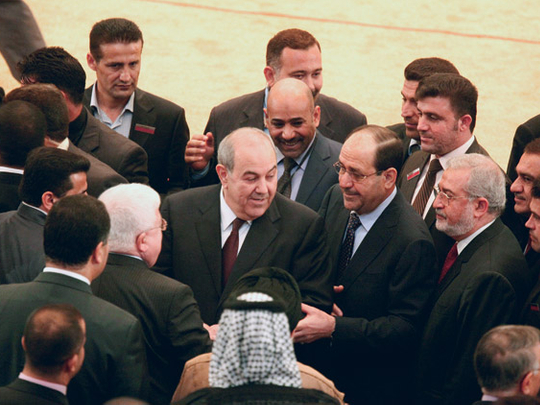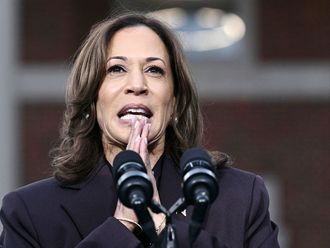
Five months after crucial elections in Iraq, the country is still without a government. The biggest two winners of the March 7 elections are locked in bitter protracted negotiations to decide who should be Iraq's next prime minister.
Al Iraqiya coalition, headed by former Iraqi prime minister Eyad Allawi, won 91 seats while the State of Law coalition, headed by Prime Minister Nouri Al Maliki won 89 seats. Both men have stated that compromise is not an option and that the other man must yield. Frustrated Iraqis have resigned themselves to a long political gridlock punctuated by rising violence, lack of services and poverty.
The high stake negotiations conducted by special committees of trusted representatives of the two archrivals betray the precarious positions of the two men. On paper both men command the support of large segments of Iraqi society, but in reality their contributions to their own blocs are very modest.
Three reasons may prevent Allawi from caving in first and accepting a junior position, such as deputy prime minister in charge of security. First, his key coalition partners who were instrumental in bringing him this far, will pressure him to refuse a secondary role to Al Maliki, especially when they have bested Al Maliki's coalition by two seats.
Second, given his age, 74, Allawi knows very well that this is his last chance to be prime minister again; it's either now or never.
Third, if he is to accept a junior role, Allawi has no guarantees that his future decisions and actions will not be reversed and nullified by Al Maliki's powerful generals in charge of security and intelligence services.
Given his limited options, Allawi's strategy is to stay firm, watch Al Maliki stew in his own juice and wait for him to commit a blunder.
Uncertainty
"The problem is that they both have equal shares of political support and both fancy themselves as a strong prime minister," says Dr Sa'ad Nagi Jawad, Professor of Political Science at Baghdad University.
"If negotiations collapse, Al Maliki will be forced to go to parliament. But given the mood in the country no one can predict the outcome of such a move and who will emerge as prime minister."
In his tenure as prime minister, Al Maliki has succeeded in alienating all political factions; the Kurds, his erstwhile Shiite allies and above all the firebrand cleric Muqtada Al Sadr.
The Iraqi National Alliance (INA) headed by Ammar Al Hakim has castigated Al Maliki in the most undiplomatic language possible while Al Sadr has called Al Maliki a liar. Al Sadr's 40 seats out of INA's 70 have given the hotheaded cleric the licence to decide whether Al Maliki will live inside or outside the Shiite's tent. Though highly unlikely, the mercurial cleric may change his mind and bless Al Maliki, but that means Al Maliki will forever be his prisoner.
So, who will be Iraq's next PM?
"Iran is dead against Allawi being a prime minister and prefers Al Maliki. The US on the other hand prefers a power sharing government in which Allawi's Iraqiya coalition plays a significant role in the new government, an outcome supported by Turkey and Saudi Arabia.
"The formation of a new Iraqi government will only succeed if no regional red lines are crossed, which is the marginalisation of the Sunnis as represented by the Iraqiya coalition," says Joost Hilterman, an Iraq expert with the International Crisis Group.
Resolving the deadlock
"The current stalemate is a constitutional problem. The Iraqi constitution cannot resolve the current deadlock and the recent interpretation of election results by the Iraqi Federal Court have muddied the picture. The Marjeia in Najaf may eventually have to step in to break this jam."
The ambitious Allawi cannot envisage a limited role for himself, not even that of president of Iraq, as insinuated by some of Al Maliki's people. He wants to fulfil his image of a tough politician, something the presidency will not allow him to achieve. His people countered back by offering Al Maliki the presidency.
But this constitutional and power vacuum cannot go on forever. If the two men fail to reach a workable agreement, Al Maliki may be forced to nominate one of his loyal protege, Ali Al Adeeb, as a candidate for the top job. "Despite the waning of US influence in Iraq, the Americans can still play a major role in facilitating the formation of a new government," says Hilterman.
"Allawi has recently said that the US wants Al Maliki as prime minister. They believe they've tested him and can work with him which is not good news for Allawi," says Jawad.
Allawi's Young Turk in parliament will likely revolt against him if Allawi compromises on crucial and explosive issues, such as Kirkuk or immunity for well known corrupt politicians or those responsible for killing and torture.
So, whether it is Allawi or Al Maliki, both men will be hamstrung as prime minister and will be forced to rule by consensus. The prospect of a fracture in their own coalitions and the constant threat of ‘no confidence' by either of these two powerful blocs will ensure that both Allawi and Al Maliki will be shadows of their earlier days.
Jasim Al Azzawi is the presenter of Inside Iraq on Al Jazeera English.









